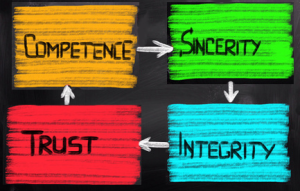Leadership & Character – Reacting to Setbacks

Many years ago when I was working for Loblaw companies, I remember attending a management conference where a remarkable individual by the name of W. Mitchell did the keynote address. He was a perfect example of an individual with great leadership and character; someone who reacted positively to the setbacks he had encountered in his life. The title of his keynote address was “It’s Not What Happens To You, It’s What You Do About It™ “. Mr. Mitchell had also written a book with the same title. His talk was fairly straightforward and yet incredibly powerful. In a nutshell, he talked about his belief that even in the most difficult circumstances, you have a choice with respect to how you respond to what has happened to you – you can either play the role of a victim and wallow in self-pity, or you can choose to move forward in as positive a manner as possible. What made his message so powerful were his own life circumstances and the degree to which he had followed his own advice. In 1971, at the age of 28, W. Mitchell was involved in a horrific motorcycle accident where he sustained burns to 65% of his body. Four months in hospital gave him the opportunity to think deeply about how to deal with the situation. He embraced a philosophy/theology/ concept called “Morehouse” that advocates taking responsibility for your actions no matter what happens to you. Read more


 The focus of today’s blog is the importance of caring to character-based leadership. There is an old quote by Theodore Roosevelt “Nobody cares how much you know, until they know how much you care.” It is widely accepted that business knowledge is a very important attribute of successful leaders. However, a leader’s business knowledge is only valuable if the leader is able to effectively communicate it so that it will influence the actions of others.
The focus of today’s blog is the importance of caring to character-based leadership. There is an old quote by Theodore Roosevelt “Nobody cares how much you know, until they know how much you care.” It is widely accepted that business knowledge is a very important attribute of successful leaders. However, a leader’s business knowledge is only valuable if the leader is able to effectively communicate it so that it will influence the actions of others. Does your organization hire leaders who can manage with their head, heart and good character principles? When I was in university attending business school learning about how to make decisions and be an effective leader, we were taught the importance of assembling all of the relevant data, analyzing the data and then using logical reasoning to come up with the best plan of action. Much of what we learned was about how to use our head – or our cognitive intelligence (IQ) – to make good decisions.
Does your organization hire leaders who can manage with their head, heart and good character principles? When I was in university attending business school learning about how to make decisions and be an effective leader, we were taught the importance of assembling all of the relevant data, analyzing the data and then using logical reasoning to come up with the best plan of action. Much of what we learned was about how to use our head – or our cognitive intelligence (IQ) – to make good decisions.  In their book “
In their book “ Have you ever had one of those days where you know you worked really hard and didn’t feel like you achieved anything? It’s often referred to as spinning your wheels. This often happens because we over-commit and fail to make good choices or have difficult conversations in order to maintain balance in our schedule and in our lives.
Have you ever had one of those days where you know you worked really hard and didn’t feel like you achieved anything? It’s often referred to as spinning your wheels. This often happens because we over-commit and fail to make good choices or have difficult conversations in order to maintain balance in our schedule and in our lives. In my
In my  I remember first reading the quote: “adversity builds character”. I thought this was a valuable insight. However, I later came across a revised version of this quote which stated: “Adversity doesn’t just build character, Adversity reveals character”. The distinction really caught my attention. I believe that there is a great truth here. The essence of a leader’s character is not the situations they have been through – it is how they act when challenged by current situations.
I remember first reading the quote: “adversity builds character”. I thought this was a valuable insight. However, I later came across a revised version of this quote which stated: “Adversity doesn’t just build character, Adversity reveals character”. The distinction really caught my attention. I believe that there is a great truth here. The essence of a leader’s character is not the situations they have been through – it is how they act when challenged by current situations. Most leaders have a high level of self-awareness and a positive self-concept. They are confident in what they believe in. When the time comes to take action, great leaders know what to do and have the confidence to do it. “He who knows others is wise; he who knows himself is enlightened.” ― Lao Tzu
Most leaders have a high level of self-awareness and a positive self-concept. They are confident in what they believe in. When the time comes to take action, great leaders know what to do and have the confidence to do it. “He who knows others is wise; he who knows himself is enlightened.” ― Lao Tzu One of the virtues of great leaders is the ability to focus on solutions and push the negatives aside. Henry Ford has been credited as saying: “Whether you think you can, or you think you can’t — you’re right”.
One of the virtues of great leaders is the ability to focus on solutions and push the negatives aside. Henry Ford has been credited as saying: “Whether you think you can, or you think you can’t — you’re right”.